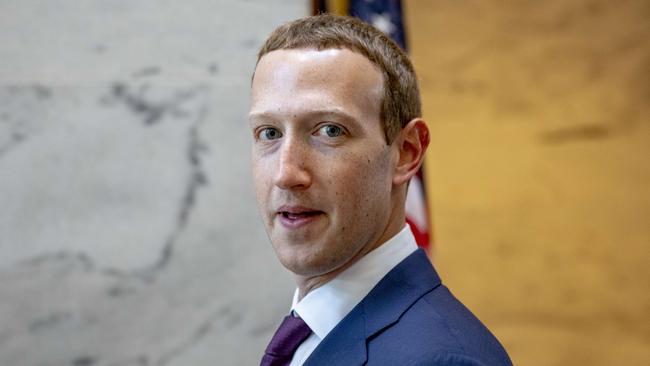Don’t just bleat about Facebook, do something

In simple terms, the only way a free global internet information service with millions of pages and billions of users can be remotely accurate, and not a blight on humanity, is for it to be a not-for-profit that lots of people are prepared to edit for nothing, as a public good.
For-profit Facebook can never employ enough fact-checkers to ensure that what is published is accurate and/or civil and still make a profit – there is simply too much stuff to check.
READ MORE: Labor takes fight to Facebook | Digital platforms response delayed
According to Wikipedia itself, 135,723 users have edited one or more of its pages in the past 30 days. These are people all over the world who are dedicated to ensuring that what appears there is accurate. They don’t always succeed, but at least they’re trying and peer reviews suggest it’s as accurate as Britannica.
It’s impossible to find out how many people “edit” Facebook because the company uses a network of independent fact-checkers, but it’s a lot less than that. In any case, they’re not empowered to take false content down, just to flag it, after which smaller numbers of people actually employed by Facebook might take it down, but probably won’t.
In a speech on Saturday attacking Facebook, Opposition Leader Anthony Albanese told how a men’s rights activist named Leith Erikson had doctored a social media image from his Facebook page.
Albanese said: “What was originally a graphic supporting Australians’ right to protest became a graphic pushing Mr Erikson’s campaign against the Family Court. Now unless you’d seen the original, there is no way that you would know the image was a fake. My words were replaced with Mr Erikson’s. The image even included my legal authorisation at the bottom – a clear breach of Australia’s electoral laws.
“When we raised this directly with Facebook, they just shrugged.”
Interesting story, but it was simply another bleat: the speech contained no ideas for ensuring that Facebook doesn’t just shrug in future.
A couple of weeks ago the inventor of the World Wide Web, Tim Berners-Lee, pulled up politicians and others who complain about Facebook and other social media and challenged them to do something about it.
In an opinion piece in the New York Times to accompany a document he calls “Contract for the Web”, Berners-Lee said: “We’re at a tipping point. How we respond to (the) abuse will determine whether the web lives up to its potential as a global force for good or leads us into a digital dystopia.”
Berners-Lee said the web needs radical intervention from all those who might have power over it: governments, companies, civil society groups and activists and every single user.
“Governments must stop blaming platforms for inaction,” he said. And oppositions too, he might have added.
If someone told us 30 or 40 years ago that there would be a global publisher with 2.45 billion readers that would publish virtually anything without checking it, and that even when it was told that something false, it would usually remain published, and that it would make vast profits by selling to advertisers the ability to target us accurately by invading our privacy, we would have thought it was just horrifying dystopian science fiction.
It’s actually quite incredible that governments put up with it, so the fact that they do leads us to assume that they find the ability to fool their citizens quite useful. Traditional media is mostly compliant, but they can’t always be relied upon to repeat lies.
One of the reasons it’s been allowed to happen, I suspect, is that Wikipedia came first, in January 2001, driven by Jimmy Wales’ vision of creating a free encyclopaedia for everyone, without him getting rich. It confirmed Tim Berners-Lee’s earlier vision of an open internet for all and seemed to herald a golden age of equality of access and benevolence.
When Facebook was launched by Mark Zuckerberg a few years later, it seemed to be part of the same movement, designed to help people to connect with each other. After all, “social media” sounds nice and, you know, social.
But Facebook is nothing like Wikipedia, and it took almost 10 years of gradually boiling the frog for this to be realised.
Now everyone understands that Facebook is just another corporation, if not more rapacious than most, and that its business model is arguably the opposite of benevolence: harvesting users’ privacy and selling it to advertisers who are allowed to lie to them.
Can you imagine an online encyclopaedia succeeding if the person in charge defended false entries “because we think people should be able to see for themselves what politicians are saying”, which is how Mark Zuckerberg defended the decision not to fact-check political ads.
It’s so transparent it makes you wonder whether Zuckerberg’s refusal to fact-check political ads, or any ads for that matter, is not just financial but a deliberate corporate strategy.
The liars are in charge. Let them keep lying and they’ll leave us alone, is perhaps the thinking. If so, it’s working.
Alan Kohler is Editor in Chief of InvestSMART.com.au



I finally started donating regularly to Wikipedia last week, not just because I use it most days but because I realised that we need its model to work. Facebook should be like Wikipedia; it won’t be, but it should. And we definitely need Wikipedia to continue.